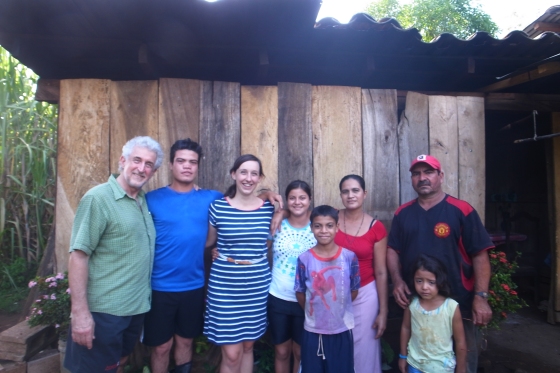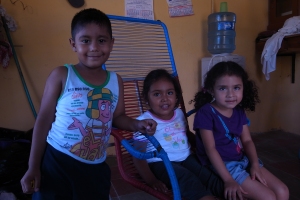After a 2 week tour of the places that are home to me in Texas, I came back to El Salvador, this time with my dad, so he could see this place that’s grabbed ahold of me and won’t let me go. I had fun introducing him to my host family, presenting him at the church in Guajoyo, walking down the streets with him, and even walking to see the milpa and pick some young corn to bring back and make tamales out of. And he, of course, got the celebrity welcoming that Guajoyo (and really all of El Salvador) has gained fame for. Since everybody in the community knows me and sees my comings and goings, they were all attentive to the arrival of my dad.
 His Spanish is a bit limited, so he did a lot of observing and gesturing and playing with young kids. I tried to check in regularly to see how he was doing, if he was feeling good and not too isolated. One day I asked how he was doing because I noticed he was being particularly quiet. “I’m fine,” he said, “I’m just thinking like a westerner. I keep trying to think about how I can make their lives better.”
His Spanish is a bit limited, so he did a lot of observing and gesturing and playing with young kids. I tried to check in regularly to see how he was doing, if he was feeling good and not too isolated. One day I asked how he was doing because I noticed he was being particularly quiet. “I’m fine,” he said, “I’m just thinking like a westerner. I keep trying to think about how I can make their lives better.”
His comment struck home with me, and I think comes from a way of thinking that we could all identify with – “we” in the sense of me and you, my westerner readers. We like explanations, and when there’s no explanation to inequality we want to fix it. And I really think that’s a great quality of our culture, that we are raised to be innovators, we seek solutions, we seek resolution to dissonance. But – because there’s always a but – we don’t always need to fix everything.
Being a volunteer with an organization that funds development projects and other kinds of projects, I think a lot about what is the most productive use of money. What is it that we’re ultimately after? For many of us, we step into situations of poverty and we see all the things that we have and they do not, and that makes us uncomfortable. Why shouldn’t this family, which is full of love and fun and so hard-working, be able to have a house free of mosquitoes, a vehicle so they don’t have to wait on the bus, a flushing toilet, and more than a few changes of clothes? They deserve such comforts as much as I do, or even more than I do. We want to fix poverty by filling that gap between what we have and what they don’t have.

Cousins of my host family who want to be when they grow up (from left to right): an engineer, a nurse, and a doctor.
But is that the most productive use of money? And we still haven’t answered that question of what we’re ultimately after. Is equality really the main goal? I think we’ll just find ourselves frustrated if that’s what we’re looking for. I think what we really mean but just hadn’t thought about is that what we really want is equal access to basic human rights for all. For me, it is unacceptable that a person has to leave their family and place they are from to work illegally in another country in order to hope to save enough money to build a house for their family. A dignified shelter is a human right. It’s unacceptable for entire communities to be exposed to diseases because of unclean water sources, because water is a basic human right. That shelters be made of cinder block instead of sheetrock, or that water be delivered via a communal well instead of to a handful of sinks and bathtubs inside each house to me is much less of an issue.
And so living here in Guajoyo, that’s what I keep my eyes opened for: in what ways are people denied access to actual human rights? Of course, we’ll probably never all agree on a single all-inclusive list of what those basic human rights are, but that’s not really the point. And each of us, knowing that there are others who live much more comfortable than we do or have more than we do will probably want to have more or be more comfortable. We always feel our house is a bit small, or our phone is a bit janky, or our wardrobe a bit outdated compared to others. The same goes here, and there are always people who want their house to be more spacious, their TVs bigger, their shoes more comfortable, their distance to the store shorter. But really, look at life in the US, where our access to THINGS is truly impressive. Does that really make us happier? I think we’ll all agree that those who find happiness do not find it in the things they have.
Yes, we think we can fix poverty with things, and I guess that’s what thinking like a westerner looks like sometimes. We look at all the things we have and think, well I could give so many of these things to people who have less than me and it would make them so happy because they have so little. And I guess it would be fun for a little while, but it wouldn’t really change anything. We’ll continue to have more than we need, and they’ll continue to be systematically denied the right to work and live in peace, with the only difference that we are now exporting the faulty mentality that we need more things to feel satisfied.
“Well what am I supposed to do then?!?!?” you’re probably shouting at your screen, gnashing your teeth and threatening to close this tab and peruse facebook instead. Stick with me; I’m a solutions-oriented westerner too, so I’ve got some ideas for you.
1) Get educated. You’re taking a great step by reading this blog, learning about the reality of people who live outside your socio-economic and cultural bracket. Know what poverty in your town looks like, and if you don’t know, maybe try riding the bus one day and just having conversations with people, do your grocery shopping in a poor neighborhood, or offer a ride to a young mom waiting on the bus. Poverty isn’t that far from any of us, and certainly not just in El Salvador.
2) Think about your basic rights and what you really need to be satisfied. Chances are, most people would say more or less the same things once we get down to it. Keep in mind, I’m not talking about comfort here. That we have a right to be comfortable is a huge lie, so stop believing it.
3) Combine steps 1 and 2. As you educate yourself – by reading news and blogs and by meeting people and seeing what poverty looks like close to you and far away – look for the places where groups of people are denied those same basic rights you identified for yourself. Why don’t they have access to those rights? What kinds of things are being done to address it? There are lot of really smart people in the world who are very interested in making the world a better place, so chances are you’ll find someone who is doing good work in the areas that caught your attention. Find out what they’re doing and how you can get involved.
4) If you have money, donate. Tithing is a central pillar of the Christian faithful, and in many ways it’s more about loosening our grip on our stuff than it is about giving to the right church or charity. Generosity is a practice, and if we’re in the practice of thinking that we don’t have enough (which, let’s face it, each of us has bought into that lie at some point or another), then even when you really can give in a way that is impactful, it’s unlikely that you will recognize it or be very willing. Studies show that it is consistently those who have the least that are the most willing to give. If you’re in that upper 40% that has plenty (if you’re reading this blog, you probably are), let’s work on turning that statistic upside down.
5) Look into what ways your practices are hurting the human rights of others. If you make it to step 5, you’re getting really advanced. One person choosing to buy fair trade items doesn’t actually do anything to the global market, but when that one person turns into an entire movement, then we’re talking about some impact. You might also think about this in terms of how you vote on local issues. We usually each vote for what is most beneficial to ourselves, but start thinking about ways that things that benefit you might negatively affect others.
There you have it, an extremely westerner response to the question of how to not think quite so much like a westerner!
wise words Catie…..you give us lots to think about….and hopefully act on….I love you!
Mom
Very well said. You are doing, and almost certainly will continue to do, important work in your life. Kudos.
Yes, very wise ! A conversation I wish more of us were having and thinking about…we need more “Catie’s in Salvador”…right her in “Nacogdoches”……poverty is right in front of us everyday….I understand, just don’t always know where to start but you have given some great suggestions Catie!!
Wow. We loved hearing your dad’s perspective of his visit yesterday. We are so proud and thankful to be connected to you, Catie!
I think wise beyond your years is shown here. Thank you for your insight and your willingness to share it. You have achieve what many westerners (even those living in other countries) do not. Well stated!
Well said. We’re proud of you.